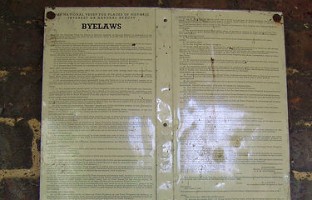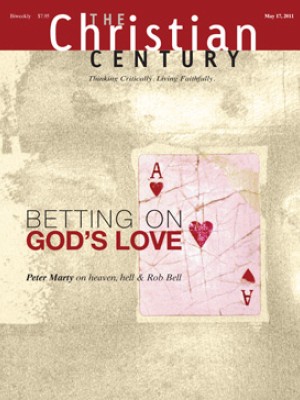What do the bylaws say? Order and disorder in the church: Order and disorder in the church
I had never concerned myself much with a congregation's bylaws, those documents that prescribe what each board or committee of the congregation is for, who can serve on each one and for how long, and generally how a church is to do its business. As a young pastor, I found issues of terms, officers, meeting dates and quorums pedestrian stuff. I was into the important matters: preaching, teaching theology, community ministry, pastoral care. Who cares about the bylaws? I didn't. Moreover, it seemed to me that those who did care a great deal about church bylaws were far more enthusiastic and knowledgeable about the bylaws than they were about scripture. A bad sign. It seemed to me that the bylaws were often trotted out as a way of extinguishing the Spirit.
Then I began working with congregations as a consultant and teacher, and I changed my mind. I came to see that bylaws were the rules of the road for congregational life and that they often became central to the discussion when there was a crisis. The pastor has resigned—what do we do now? Check the bylaws. The senior minister and the organist are at each other's throats, each insisting he or she is in charge—what do we do now? Let's see if the bylaws are any help. There's conflict because the board of trustees has told the church council that although there's money in the bank, the council can't spend it on what it deems a crucial mission initiative because it isn't the council's money to spend. What do the bylaws say about the jurisdiction and authority of the trustees and the council?
Read our latest issue or browse back issues.
We pay attention to the bylaws when there is a crisis. This may not be the only or even the best way forward at such times, but bylaws provide guidance and direction that is impartial and helpful. I noticed something else: congregations that pay little heed to their bylaws are often in a state of perpetual crisis, chronic conflict and steady decline.
One conflicted congregation I worked with was arguing about the kind of music that was being used in worship and about whether the music director was the right person for the job. Everyone had an opinion on the matter, and most were strongly held opinions. Moreover, everyone seemed to think it was his or her business to help decide what the music should be, who the music director should be and how the situation should be handled. I met with the congregation's board to try to determine who had employed the music director and to what person or group the music director was accountable.
"What do your bylaws say?" I asked. From the looks on people's faces it was clear that no one knew and no one had thought to look for such guidance. Someone said, "Well, we don't really take the bylaws seriously here. We're much more informal. We're like a family." He said this with pride, as if the church were too free-spirited or special to need rules of the road. To myself I thought, "Yeah, you're like a family all right—a highly dysfunctional family." I suggested that they might be suffering from "sloppy agape," a situation in which love and good intentions are disordered, leading to a lack of clarity or accountability. I also said they would do well to determine who had what role and responsibility (and authority) in the situation they faced.
Congregations that are not clear about how their households are ordered or do not respect the given patterns of order often function like six-year-olds playing bunch-ball soccer. In this game, everyone runs to the ball, creating a scrum in which kids flail about in the ball's direction. What happens is that shins get kicked, kids start to wail and the ball doesn't move much. When the ball does happen to pop out from the pack of kids, there's no one out beyond the pack to pick it up. As a soccer coach, my mantra in these situations was "Play your position." When team members play their positions they are much more effective at moving the ball down the field. But this requires two things: known and assigned positions (bylaws) and discipline. Discipline means that instead of rushing to the ball, you play your position and trust your teammates to play theirs. When kids get this and see that it works, it's a revelation.
There's a lot of bunch ball being played in stuck or declining congregations these days. People have bought into the idea that everyone needs to be in on every decision or that everyone has a right to put his or her oar in the water about every big or little thing. We may sanction this with appeals to participation, inclusion and equality, but often the result is sore shins, little or no progress and general frustration. There is no order in the household of God—only a mess.
In a chapter in Practicing Our Faith (edited by Dorothy C. Bass), Christian ethicist Larry Rasmussen discusses order in congregations:
Governance is a crucial part of our life together for at least two reasons. One reason is simple: life is a mess. . . . Some of it is a mess all the time, all of it is a mess some of the time, and disordered houses do not stand. Just as our bodies do poorly without food, bodies politic do poorly without governance. Communities, in order to be communities, must be ordered, cared for, led. The other reason is equally vital: governance is necessary for the positive flourishing of life.
"Disordered houses do not stand." "Communities, in order to be communities, must be ordered." When 1 Timothy uses such a metaphor for the church, the author talks about the "household code," or how to order the household of God so that the mess of life doesn't overwhelm us and disrupt the positive flourishing of life in loving relations in that household.
Order is important. Rules of the road and governance and bylaws matter. They help us have order, avoid disorder and function fairly and openly. If all of this sounds old-fashioned and uptight, consider the newfound popularity of the concept of "boundaries" with respect to congregations and, in particular, pastors.
Having good boundaries means that a person understands his role and responsibilities. A pastor or layperson with good boundaries knows where he stops and others start. He takes responsibility for his own words, feelings and actions. He knows, for example, the difference between being a pastor and being a friend, and the difference between hearing the most personal of concerns and at the same time avoiding being intimate in ways that are inappropriate and abusive. Pastors who do not know and mind their boundaries are a source of confusion and pain to others. In extreme cases, they generate havoc that can destroy a congregation.
But where there is good order, reliable governance, clarity about roles and attention to appropriate boundaries, a congregation and its members tend to flourish. There is a sense of reliability and safety that allows a congregation to feel confident in the face of challenges and change. There is confidence in the pastor, who considers good governance and administration to be an aspect of pastoral care.
Edwin Friedman and Peter Steinke call these qualities crucial parts of a congregation's "immune system" and say they protect the body from infection and sickness.
Several types of infection or illness beset congregations frequently today. I've mentioned sloppy agape. In the name of concern and compassion, everyone makes everything his or her business. Decisions made by one authorized group are unmade by another unauthorized group because "We don't do things that way here" or "This would hurt so-and-so's feelings."
Another disorder might be called the "pastor master." The only order in these congregations is whatever the pastor says it is. Everything must be done that person's way, and often in order to make that person feel needed, flattered or appreciated. No one can question the pastor without becoming an "enemy." No one else can exercise authority, and there are no rules of the road except the personality and dictates of the pastor. If sloppy agape sometimes causes the house to fall, so do the outsized needs of a pastor master.
A third disorder is the "unruly member," that disruptive and even toxic member in the congregation who is not held accountable. Usually because of some personal problems or personal spiritual disorder, an individual (or small group) demands constant attention and takes advantage of, even bullies, other members of a congregation and the pastoral leaders. Like a malignant tumor, the unruly member requires the attention and enabling of others, which implicates the congregation as a system. When a congregation lacks clear behavioral expectations and the capacity for reasonable church discipline, the unruly member spins out of control and impedes the proper functioning of the congregation.
Fourth, a congregation can experience a "hardening of the arteries" when it becomes legalistic and rigid and loses all flexibility and suppleness. There is no spirit of discernment; there is no "testing of the spirits." Whoever has the best mastery of the bylaws or Robert's Rules of Order or the Book of Discipline runs the show. Fear rules instead of love.
All of these types of contemporary congregational illness and disorder underscore the importance of sound governance, appropriate bylaws and good boundaries. While order and good governance can, like every virtue, be taken to an extreme and flip over and become a vice, that doesn't happen often. Usually the solution is to practice good governance, pay attention to the rules of the road, ensure openness and transparency whenever possible and mind our boundaries. Then a congregation is a safe place where faith, hope and love may flourish. Without rules and boundaries and yes, bylaws, we are a poor witness for Christ to the world and a disordered house that does not stand.







